Archive for 'Grammar'
20 Common Opposite Verbs in Arabic Posted by Ibnulyemen اِبْنُ اليَمَن on May 31, 2018
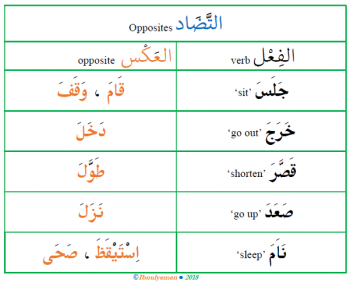
A good strategy to augment our vocabulary when learning a new language is through opposites. Conjugating them by deriving different forms from the root further enhance our acquisition, and lead to more spontaneous usage. This post provides a list of 20 common opposite verbs with example sentence. الفِعْل verb مَاضٍ ، مُضَارِع ، مُسْتَقْبَل…
Forms of Nominal and Verbal Plurals in Arabic Posted by Ibnulyemen اِبْنُ اليَمَن on May 29, 2018
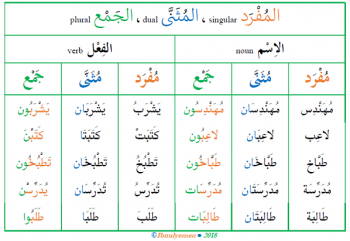
As explained in an earlier post, nouns الأَسْمَاء and verbs الأَفْعَال have three forms: singular مُفْرَد, dual مُثَنَّى, or plural جَمْع. Unlike the formation of dual noun forms, plural noun forms are a bit more complex because they constitute three types: sound masculine plural جَمْع مُذَكَّر سَالِم, sound feminine plural جَمْع مُؤَنَّث سَالِم, and broken…
Relational Adjectives and Nationalities in Arabic Posted by Ibnulyemen اِبْنُ اليَمَن on May 26, 2018
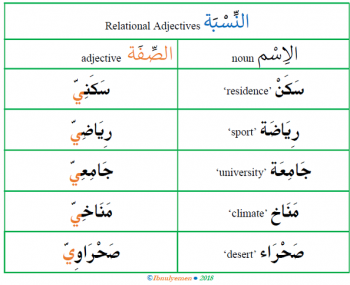
A relational adjective is the adjective that is used to relate one thing to another. In Arabic, this is called نِسْبَة ‘relation.’ This type of adjectives is common in Arabic. To form adjectives of this type, we simply add a suffix the end of nouns, that is يّ (ي with shaddah). This suffix/ي is called…
Forms of Nominal and Verbal Duals in Arabic Posted by Ibnulyemen اِبْنُ اليَمَن on May 22, 2018
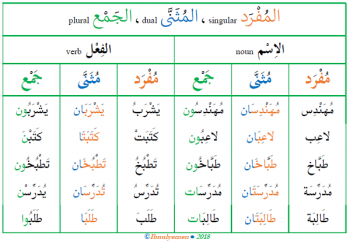
As for number, nouns الأَسْمَاء and verbs الأَفْعَال in Arabic have three forms: singular مُفْرَد, dual مُثَنَّى, and plural جَمْع. The singular refers to a single entity, the dual refers to two entities, and the plural refers to three or more. Forming the dual and plural forms from the singular is usually straightforward. This is…
Tense and Negative Affixes in Arabic Dialects and MSA Posted by Ibnulyemen اِبْنُ اليَمَن on May 8, 2018
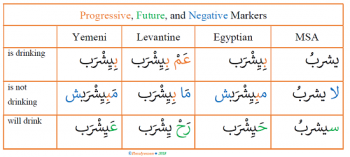
Two obvious differences between Arabic dialects and Modern Standard Arabic (MSA) are the parsing marks and certain affixes. In MSA, the time of the action of the present verb is indicated through the parsing marks. In dialects, it is known through prefixes. Likewise, MSA sentences are negated using separate negative particles. In dialects, the original…
A Vital Arabic Particle with Multiple Meanings Posted by Ibnulyemen اِبْنُ اليَمَن on Apr 26, 2018
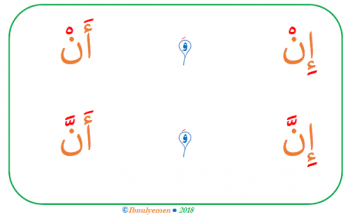
Arabic is full of words that are spelled the same but have different meanings and words that are spelled the same but pronounced differently. One example is the Arabic particle ان – alif and nun, with no ء hamzah or diacritics. Their addition and position make the word versatile. When the ن has fahHah with…
What is Arabic Sentence Parsing? Posted by Ibnulyemen اِبْنُ اليَمَن on Apr 24, 2018
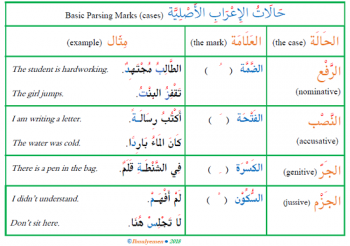
Arabic sentence parsing is called إِعْرَاب. It is a change in the way final letters of words, namely nouns and verbs, are assigned diacritical marks which are called parsing marks عَلَامَات الإِعْرَاب. They are فَتْحَة fatHah, ضَمَّة DHammah, كَسْرَة kasrah, and سُكُوْن sukuun. They have a grammatical value and cause a slight change in pronunciation…


